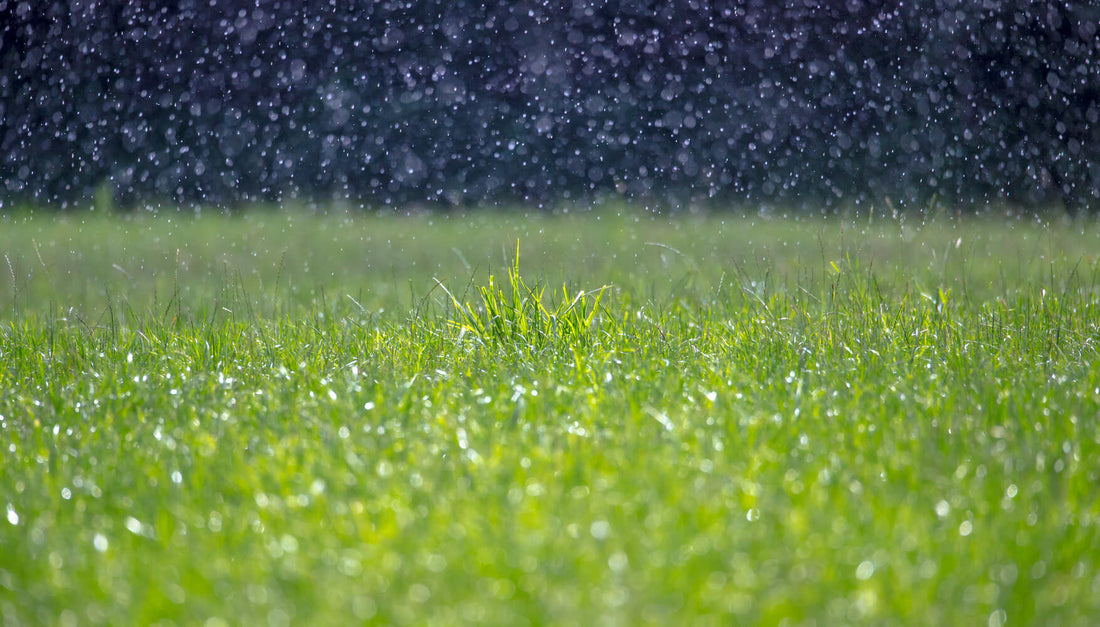As lawn care experts, we know that applying fertilizer is crucial for a lush, green lawn. If you're pondering the question, what happens if you apply fertilizer to wet grass, you've come to the right place.
Applying lawn fertilizer to wet grass might seem harmless, but it can actually lead to several issues that you'll want to avoid.
In this article, we'll dive deeper into why it's not the best idea, discussing problems such as nutrient burn, uneven distribution, and potential pollution risks.
So, if you're ready to learn how to properly care for your lawn and avoid these common pitfalls, continue reading.
What this article covers:
- Can I Apply Fertilizer to Wet Grass?
- Why You Shouldn't Apply Fertilizer on Wet Grass
- When Should I Fertilize My Lawn?
- How Much Fertilizer Should I Apply?
- What If It Rains After I Have Applied Lawn Fertilizer?
Can I Apply Fertilizer to Wet Grass?
Many people wonder if they can apply fertilizer to wet grass. The short answer is no. As per our expertise, wet grass can cause several problems when combined with fertilizer.
Why You Shouldn't Apply Fertilizer on Wet Grass
There are many reasons why you shouldn't apply fertilizer on wet grass. Let's look at a few of them:
Your Lawn Won't Absorb The Nutrients
When grass is too wet, it struggles to absorb the nutrients effectively. This means that even though you've applied fertilizer, your lawn won't benefit from it as much as it should.
The waterlogged soil prevents the roots from taking up the essential nutrients, leading to poor growth and an unhealthy lawn.
Additionally, the excess moisture can cause the fertilizer to wash away before it has a chance to penetrate the soil properly. This not only wastes your fertilizer but also increases the risk of nutrient runoff, which can harm the environment.
From our experience, it's clear that applying fertilizer to wet grass is not an efficient way to nourish your lawn.
To maximize the benefits of fertilization, it's best to apply it when the grass is dry, but the soil is slightly moist.

Uneven Distribution Of Fertilizer
When the grass is wet, fertilizer tends to clump together. This results in an uneven distribution, which means some parts of your lawn might get too much fertilizer while other parts get too little.
From our experience, this uneven application can cause several issues. Areas with too much fertilizer can suffer from nutrient burn, damaging the grass and creating brown patches.
Meanwhile, areas with too little fertilizer won't receive the necessary nutrients, leading to poor growth and weak spots in your lawn.
This inconsistency not only affects the overall health and appearance of your lawn but also reduces the effectiveness of your fertilization efforts. It's essential to ensure even distribution to achieve a lush, green lawn.
You Risk Overfeeding Your Lawn
Our findings show that applying fertilizer to wet grass increases the risk of overfeeding. Overfeeding can burn the grass, leading to unsightly brown patches.
This happens because wet grass causes fertilizer to clump together, leading to concentrated areas of nutrients. When these concentrated areas are exposed to the sun, they can cause significant damage to the grass blades.
Will fertilizer burn grass if not watered properly? Absolutely, especially if it's over-applied on wet grass. Proper watering after fertilization is crucial to prevent nutrient burn and ensure even distribution.
To avoid these issues, it's essential to apply fertilizer when the grass is dry and to water your lawn thoroughly afterward to help disperse the nutrients evenly across your lawn.

Risk Of Pollution
Fertilizer on wet grass can easily wash away, especially if it rains soon after application.
This runoff can lead to pollution of nearby water bodies, contaminating them with excess nutrients. These nutrients can cause harmful algal blooms and other environmental issues.
What lawn fertilizer is safe for well water? Always choose eco-friendly options made from natural or organic ingredients to minimize the risk of contamination.
However, it's crucial to avoid applying even these safer fertilizers to wet grass to prevent runoff and ensure that the nutrients stay where they are needed—in your lawn.
By following these precautions, you can protect both your lawn and the surrounding environment from pollution.
When Should I Fertilize My Lawn?
The best time to fertilize your lawn is when the grass is dry, but the soil is moist. This ensures that the fertilizer is absorbed efficiently without the risk of burning the grass.
Applying fertilizer, such as our NutriGreen Fertilizer, under these conditions allows the nutrients to penetrate the soil effectively and reach the grass roots.
It's important to avoid fertilizing during periods of drought or when the grass is wet, as this can lead to uneven distribution and potential nutrient runoff.
Additionally, fertilizing in early spring and late fall, when temperatures are moderate, can help promote healthy growth throughout the year.
By choosing the right timing, you can ensure your lawn gets the maximum benefit from the fertilizer, resulting in a lush, green yard.

How Much Fertilizer Should I Apply?
It's essential to follow the recommended application rates on the fertilizer package. Over-application can harm your lawn by causing nutrient burn and potentially damaging the grass, while under-application won’t provide the desired results in terms of growth and health. Typical application rates include 4-5 lbs. Per 1,000 sqft.
If you're using the best fall lawn fertilizer, make sure to apply it according to the seasonal needs of your grass type.
For instance, cool-season grasses benefit from fall fertilization to strengthen roots and prepare for winter.
Measure your lawn accurately and calculate the amount of fertilizer needed based on these recommendations to ensure an even and effective application.
What If It Rains After I Have Applied Lawn Fertilizer?
If it rains lightly after you've applied fertilizer, it can help the nutrients soak into the soil more effectively. This gentle watering allows the fertilizer to reach the grass roots, enhancing its benefits.
However, if heavy rain occurs, it can wash away the fertilizer, reducing its effectiveness and potentially causing runoff pollution. This runoff can carry nutrients into nearby water bodies, leading to environmental issues.
Therefore, it's important to monitor the weather forecast and plan your fertilization accordingly to avoid heavy rains soon after application.
By doing so, you ensure that your lawn gets the maximum benefit from the fertilizer and minimize the risk of environmental harm.
Conclusion
Applying fertilizer to wet grass is not recommended. From our experience, it can lead to nutrient wastage, uneven application, overfeeding, and pollution risks.
These issues can compromise the health and appearance of your lawn, making your efforts less effective. For the best results, apply fertilizer to dry grass and follow the instructions on the packaging carefully.
At Lawn Synergy, we're dedicated to helping you achieve the healthiest lawn possible. Visit our website for more tips and products to keep your lawn looking its best.
Take the first step towards a greener, healthier lawn by exploring our expert advice and high-quality lawn care products today.
If you want to learn more, why not check out these articles below:
- What Do You Put Down First Grass Seed or Fertilizer
- What Does Fertilizer Do for Grass
- Best Fertilizer to Make Grass Green
- Best Organic Fertilizer for Lawn
- Best Weed and Feed for Lawns
- Best Lawn Fertilizer for Texas
- Best Lawn Fertilizer for Florida
- Best Lawn Fertilizer for Spring
- Best Time to Fertilize Before or After Rain
- Best Lawn Fertilizer for Winter
- Liquid vs Granular Lawn Fertilizer
- Can You Put Starter Fertilizer on Existing Grass
- Lawn Food vs Fertilizer
- Do I Need to Fertilize My Lawn?
- Is Lawn Fertilizer Toxic?





